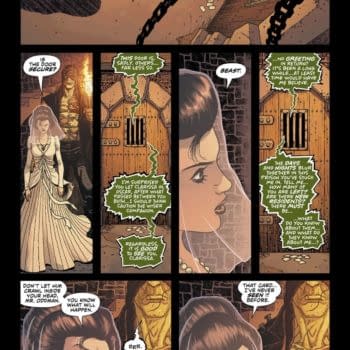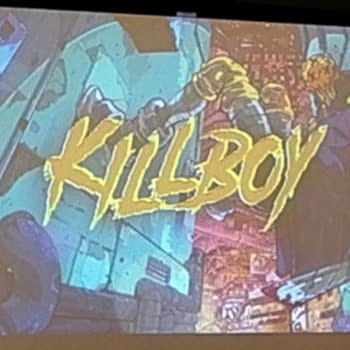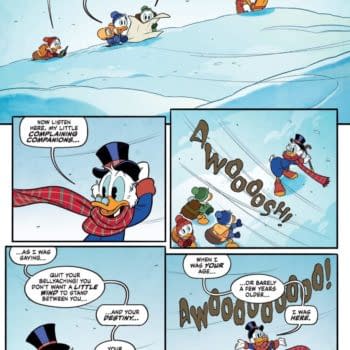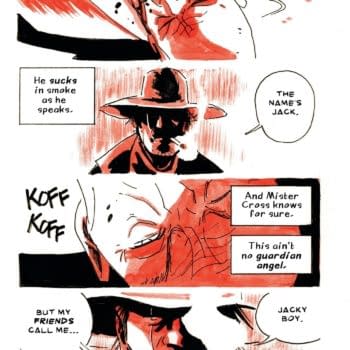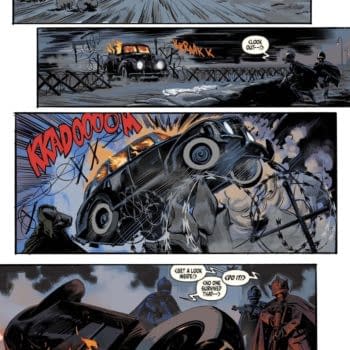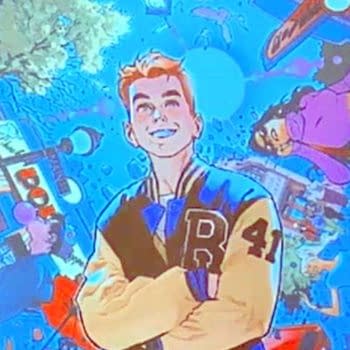Posted in: Comics, Recent Updates | Tagged: 30 days of night, Beau Smith, ben templesmith, Bruce Canwell, cerebus, charles schulz, clive barker, dark horse comics, darwyn cooke, Dave Gibbons, dave sim, Dean Mullany, donald westlake, harlan ellison, Hunter S. Thompson, idw, jack kirby, jim lee, jim steranko, John Nee, john romita sr, Locke & Key, mike mignola, mike richardson, richard matheson, Robert Block, scott dunbier, stephen king, steve niles, ted adams, wildstorm, Yoe Books!
'Have Realistic Expectations And Treat People Fairly' – The 15th Anniversary IDW Interview With Ted Adams

Hannah Means-Shannon: How have books influenced your life? Was working in the business side of publishing immediately appealing to you as a young person?
Ted Adams: I knew I wanted to work in publishing for as long as I can remember. I have been a voracious reader my entire life. Friends and family all know that I'm happiest when I'm reading. When I was a kid, it drove my family crazy when we went on family trips and I'd want to sit in the car and read. We were at the Grand Canyon once and I didn't care—I just wanted to read.
Most of my favorite memories of growing up revolve around reading and I'm lucky that my parents were extremely supportive of it. Whenever we'd visit a new city, I'd look up the comic store and used book stores in the yellow pages of the phone book and they'd let me pick out a couple of stores to visit. Now that I have a son of my own, I can see how much they let me pursue my passion and there's no question that there wouldn't be an IDW if they hadn't. My son is interested in very different things than me so I always try to do the same for him, which, in his case means trips to the local skate parks, beaches, or mountains so he can ride his skateboard, surfboard, or snowboard.
It's hard for anyone under the age of 30 to understand, but when I was growing up, you didn't have access to every book at all times via an iPad. I could spend hours in a used bookstore looking for books by my favorite authors and browsing for new authors. When I was a teenager, my favorite authors were Harlan Ellison and Stephen King. King's books were generally pretty easy to find, but Ellison's books were harder to find, and whenever I found a new one, it was an exciting day!
I have an aunt and uncle who also read in the same way I did and they were good role models. When I would visit them each summer, they would let me read any book I wanted! My aunt is an expert on Oz so every birthday and Christmas they gave me a rare Oz book by Baum or Thompson. Those books are still some of my most prized possessions today.
When I was in college, I worked at the college bookstore and loved it. I got to read books from the store during my breaks and the manager of the store let me take home books that had been stripped of their covers during the return process. I had hundreds of paperbacks in my college apartment with no covers and I know my friends all thought I was crazy.
I'm a much more well rounded person today, but even now I usually let my girlfriend drive us around on weekends so I can sit in the passenger seat and read (granted, these days it's almost always IDW material that I'm reading).
HMS: You worked with a number of publishers prior to launching IDW, including Eclipse, Dark Horse, and Wildstorm. What are some insights you gained by working with a variety of publishers that helped prepare you for developing your own company?
TA: In addition to knowing I wanted to work in publishing, I also knew from an early age that I wanted to own my own business. I honestly never dreamed that I'd own a company that publishes comic books, but I figured the best way to eventually own my own business would be to get an education in business and to go work for a bunch of different companies.
I was very fortunate that after I received both my undergraduate and graduate degrees, I worked for businesses that were run by extremely smart entrepreneurs.
Dean Mullany (Eclipse) was a pioneer in the world of comics. He really set the model that all independent comic book publishers have followed since. Working for him right out of college, I had the opportunity to learn how everything was done, e.g. how deals were struck, how to work with printers, how marketing worked, and so much more. I'm extremely proud that Dean (and Bruce Canwell) publish the Library of American Comics books with IDW. I still ask Dean for advice from time to time.
I also met Beau Smith when I worked at Eclipse and he's still one of my closest friends. Beau's positive attitude and common sense approach to business is something that I aspire towards every day. He's been a mentor to me for almost 20 years and he's another guy that taught me the things I needed to know to do this job.
When I worked for Mike Richardson at Dark Horse, the company was absolutely on fire. It was the early days of Star Wars comics and the Legend books had just started coming out – basically I just loved everything they published at that point. Mike was one of the most entrepreneurial and driven people I've ever met and I loved seeing the way his company responded to his personal passions.
Jim Lee and John Nee are two of the smartest people I've ever met. Working for them at WildStorm gave me the chance to see how two people could work together to make each other stronger. I've never met anyone who has a better sense of what the comic market wants than Jim, and I've never met anyone who, often through sheer force of will, can make things happen like John. If those two ever partner up again, I want to be a part of it.
I know how lucky I've been to have such strong role models and mentors. Not a day goes by that I'm not influenced by those experiences.
HMS: What was it like looking at the first issue of 30 Days of Night, the company's first comic, before it was released? Did you have any sense that this could change the direction of IDW and make comics a major focus for the business?
TA: I honestly didn't think it would necessarily change the direction of IDW but I'm a pretty determined person and I was extremely proud of the book. I wanted to get it in front of as many people as possible.
As you'd expect from a completely unknown publisher, the pre-orders for the first issue were terrible. No one knew who we were and Steve Niles and Ben Templesmith weren't well known yet.

That press, combined with marketing our new presence in Hollywood, made it so when 30 Days of Night came out, the demand was so strong it was the #1 graphic novel that month. To be honest, that fact is still hard for me to believe. Again, you have to remember this wasn't the IDW of today. Back then, no one knew who we were and we had the #1 graphic novel in the country!
I have been fortunate to accomplish a lot of things that I'm proud of with IDW, but publishing 30 Days of Night still stands near the top for me.
HMS: When you take on a major and well-known property like My Little Pony or Teenage Mutant Ninja Turtles, is that a triumphant moment at the office? Do you all geek out over becoming the home of beloved characters and bringing them to comics?
TA: Of course! It's hard to describe how excited I am about the books we publish.
When I start to think back on it, it becomes a little overwhelming for me. As we discussed, I've been reading from a very young age and I've been able to publish many of the creators and characters that I read growing up.

This year alone we're going to publish a Cerebus book with Dave Sim, an adaptation of Hunter Thompson's Fear & Loathing in Las Vegas, the Parker prose novels with all-new illustrations by Darwyn Cooke, Artist Editions featuring Charles Schulz, Dave Gibbons (Watchmen), Jack Kirby (Fourth World), Mike Mignola (Hellboy), Jim Steranko (S.H.I.E.L.D), and many more. Ten years ago, if you'd told me I was going to publish any ONE of those books, I'd have thought you were crazy.
HMS: Are there particular benefits for IDW to being solidly established at 15 years in business, but not yet having to live down the shadow of previous accomplishments like the Big Two? There's definitely still a freshness to IDW—is that something you hope to hang onto?
TA: I'm proud of the fact that we're a very diverse publisher. I see my role as being a publisher who will continue to support the editors and creators who work at IDW so they can do their best work.
HMS: Are there any projects at IDW particularly associated with the 15th anniversary this year, whether publications or events at conventions for fans to look out for?
TA: For our 10th anniversary, we wrote a book about the company's history that can be read here.
We don't have anything similar planned this year, but we are increasing the frequency of our Hundred Penny Press books, which allow readers to sample our books for $1.00. Many of those books will be some of the key comics we've published over the years.
HMS: What's been the most rewarding project for you, personally, to see into fruition, over the last 15 years?
TA: I'm not sure there's a way to answer that question without potentially hurting lots of people's feelings. Every Thursday, our printer brings us advance copies of the books that have just been printed, and that's always the most rewarding part of my job.
Every time we get an advance copy of an Artist Edition or a book from the Library of American Comics or Yoe! Books it goes right into my briefcase so I can take it home to read. (Well, the Artist Editions don't fit in my briefcase, but you know what I mean).

I grew up reading the Parker novels by Richard Stark. Many years ago, Scott Dunbier arranged a lunch with Darwyn Cooke and he told us he wanted to do adaptations of them. I couldn't believe my good luck! I believe those are some of the best graphic novels ever published.
When it comes down to it, I'd say that Locke & Key has been the most rewarding project. It's one of the best stories ever told in comics by two guys who are at the top of their game. I'm also proud of this one because I put a lot of IDW resources into marketing and promoting the series over the years. I wanted the book to find the audience it deserves and it did.
HMS: With the growth of creator-owned comics and self-publishing, there are a lot of small businesses out there right now. Do you have any particular advice to share with younger companies who hope to make it to 15 years in the business?
TA: Have realistic expectations and treat people fairly.
HMS: IDW is launching gaming this year, including tie-ins to 30 Days of Night and Kill Shakespeare. How significant is gaming going to become in the next five years for IDW?
TA: I don't project out as far as five years but IDW Games is an important part of how we plan to grow over the next couple of years. In the next month or two, we'll make an announcement that will allow us to become a big player in the game category very quickly.
*Photo of Ted Adams at SDCC is courtesy of Kendall Whitehouse
Hannah Means-Shannon is EIC at Bleeding Cool and @hannahmenzies on Twitter











